Key takeaways:
- Panel anxiety is common and can stem from fear of judgment, pressure to perform, and unpredictability in discussions.
- Preparation strategies, such as research, practice, and visualization, can significantly reduce anxiety and improve performance.
- Techniques like deep breathing, positive affirmations, and physical activity are effective in managing anxiety before and during panel discussions.
- Engaging with the audience and recognizing shared experiences can transform the panel experience from stressful to enjoyable.
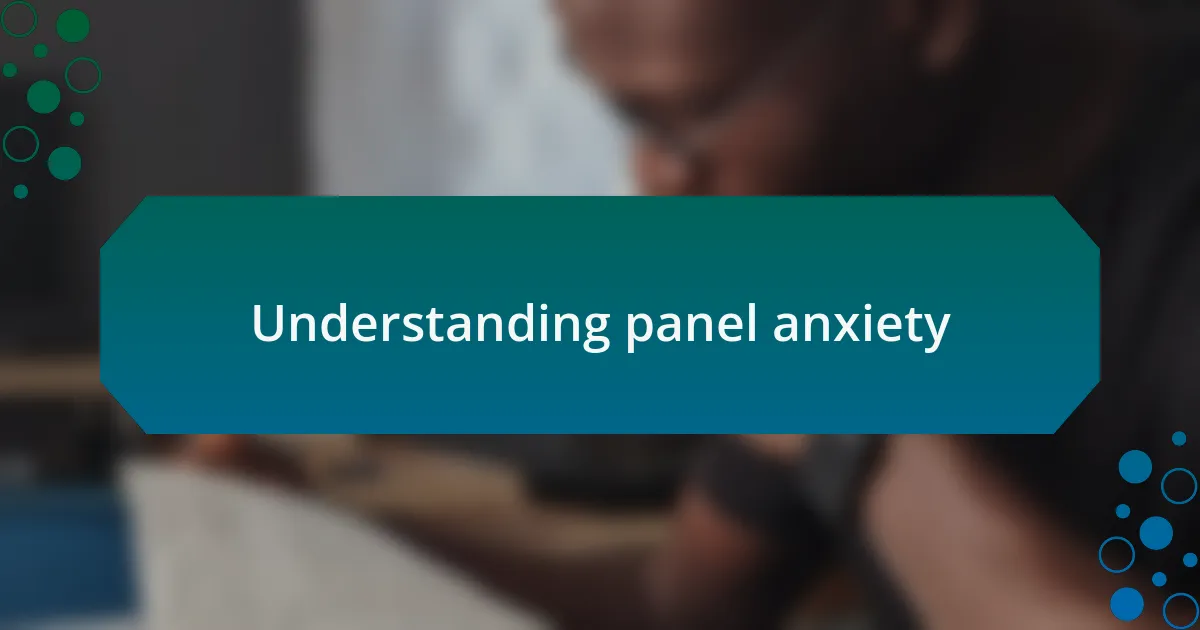
Understanding panel anxiety
Panel anxiety is a common experience for many, often stemming from the fear of public judgment or the pressure to perform. I remember my first panel discussion vividly; my heart raced, my palms felt clammy, and I could hardly focus on the questions being asked. What is it about speaking in front of an audience that can make even the most knowledgeable individuals second-guess their expertise?
When I think back to those moments, I realize that the anticipation can feel overwhelming. It’s like standing on the edge of a diving board, the water below looking both inviting and intimidating. I often found myself thinking, “What will they think of my ideas?” These feelings are perfectly normal and can resonate with anyone preparing to share their thoughts in a public forum.
These anxieties can sneak up on us unexpectedly, affecting our performance and enjoyment of the experience. When I accepted that these nerves were part of the process rather than a signal of impending failure, I felt a huge shift. I began to approach panels as conversations rather than examinations; this perspective not only eased my anxiety but also enhanced my engagement with the audience. How do you react when those nerves hit? Often, I remind myself that the audience is just as curious and excited about the conversation as I am.
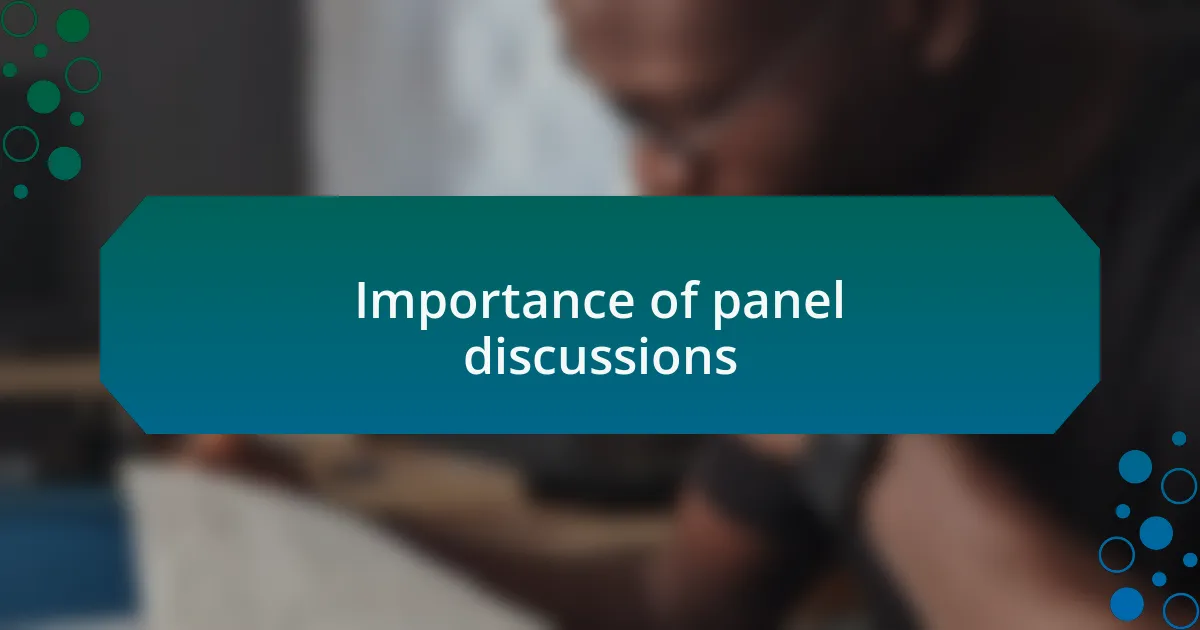
Importance of panel discussions
Panel discussions hold immense value in today’s dialogue-driven world. They create platforms for diverse voices, fostering a rich exchange of ideas that can inspire and educate audiences. I’ve noticed that when experts come together, the synergy can lead to unexpected insights—like discovering a fresh perspective that challenges my own understanding.
Moreover, these discussions allow participants to connect over shared interests and conflicting viewpoints. I recall a memorable panel at a book festival where the debates were heated but respectful. It was enlightening to see authors grapple with their interpretations and learn from one another in real-time. Engaging in this way gives the audience a sense of belonging, as they witness the dynamic nature of thought in action.
As someone who has taken part in several panels, I’ve found that they can demystify subjects that once felt daunting. When I listen to panelists express their struggles and triumphs, I feel a camaraderie with them. This shared experience cultivates an environment where everyone learns—panelists and audience members alike. Have you ever felt that moment of connection despite differing opinions? That’s the power of panel discussions, bringing together a community of thinkers.
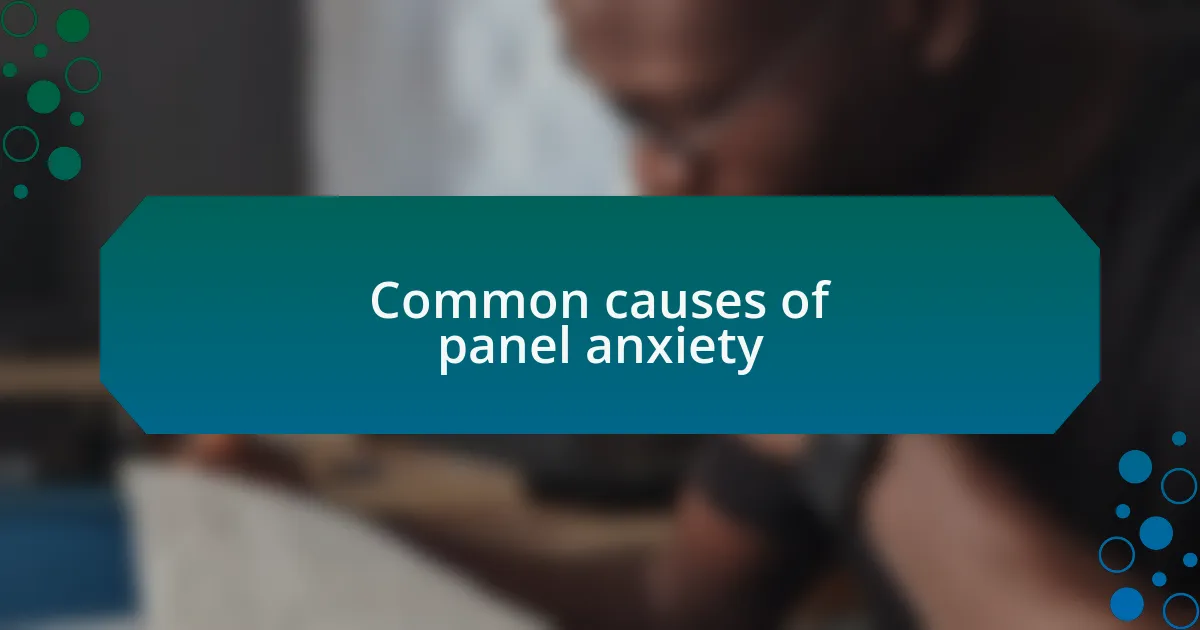
Common causes of panel anxiety
Panel anxiety often springs from the pressure to perform in front of an audience, which can be overwhelming. I still remember my first panel where I felt like all eyes were on me, creating an intense fear of making mistakes. Have you ever found yourself worrying about being judged for your opinion? That fear can escalate into crippling anxiety.
Another common cause of panel anxiety is the unpredictability of discussions. You never know how the audience will react or what questions may arise, which can leave you feeling vulnerable. I recall a situation where a question completely caught me off guard, and my mind went blank. That feeling of uncertainty can be paralyzing, making it hard to focus on contributing meaningfully.
Lastly, a lack of confidence in one’s expertise can contribute significantly to anxiety. Even experienced speakers can doubt their knowledge or worry about being upstaged by others. I once participated in a panel where my fellow panelists were well-established authors. I couldn’t shake the feeling that I was out of my league, which only intensified my anxiety as the discussion unfolded. Have you felt that way in a similar setting? It’s a challenge many face, but recognizing it can be the first step toward overcoming those feelings.
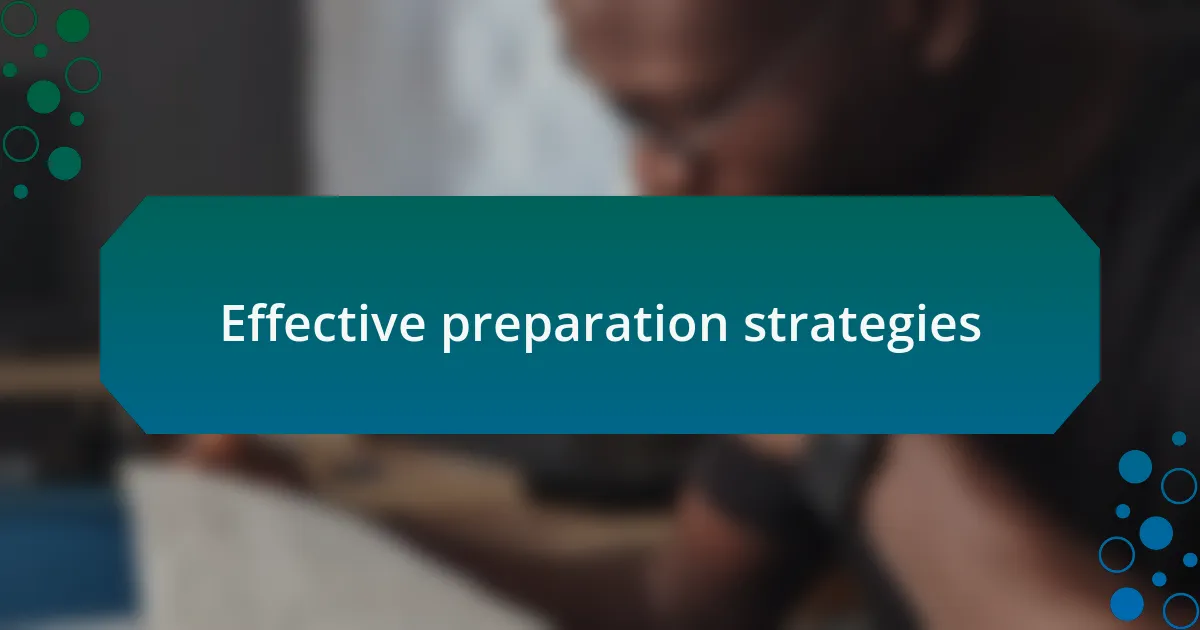
Effective preparation strategies
Effective preparation strategies can truly make a difference in managing panel anxiety. I vividly recall a time when I turned to extensive research to boost my confidence before a panel. Not only did learning more about the topics help me feel more prepared, but it also gave me a sense of control over the unpredictable nature of discussions. Have you considered how thorough knowledge could change your perception of your expertise?
Another strategy that worked wonders for me was to practice with friends. I would often gather a small group to simulate the panel experience, complete with mock questions and discussions. This not only familiarized me with potential inquiries but also helped reduce the fear of being in front of an audience. By the time I faced the actual panel, it felt like talking with old friends rather than performing under scrutiny. Have you ever tried this approach?
Finally, visualization techniques played a crucial role in my preparation. Before each event, I would take a moment to visualize myself on stage, confidently engaging with the audience. This practice helped calm my nerves and set a positive tone for my performance. How might picturing success shift your mindset on the big day? Embracing these strategies might just be the key to transforming your panel anxiety into something manageable and even enjoyable.
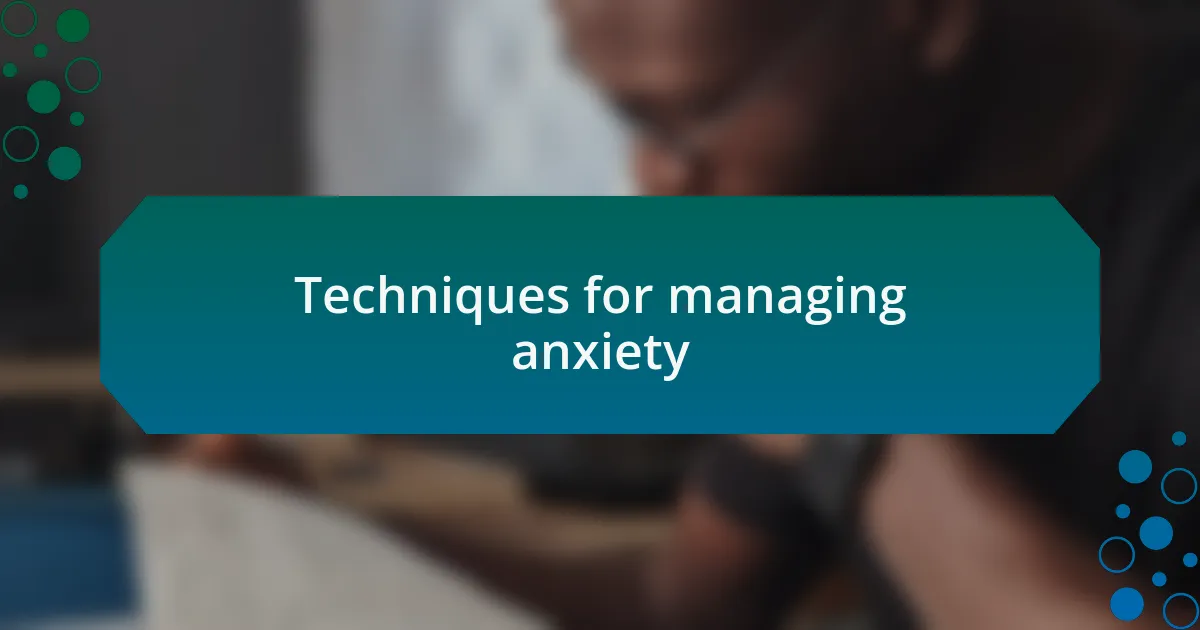
Techniques for managing anxiety
I found that deep breathing exercises were a game-changer for my anxiety. Before stepping onto the panel, I’d take a moment to breathe in deeply, hold it for a few seconds, and then exhale slowly. This simple technique helped ground me, allowing me to focus rather than spiral into panic. Have you noticed how a few mindful breaths can shift your perspective in a stressful moment?
Another approach that has brought me considerable peace is embracing positive affirmations. I began compiling short phrases that resonated with my experiences, such as “I am prepared, and I am capable.” Reciting these statements in the days leading up to the event transformed my anxious thoughts into a sense of reassurance. What words resonate with you that could bolster your confidence?
Staying physically active is yet another method that has worked wonders for me. I noticed that engaging in a brisk walk or a light workout the day of the panel significantly alleviated my nerves. It’s amazing how movement can serve as a natural stress reliever. Do you have a favorite activity that energizes you and eases tension?
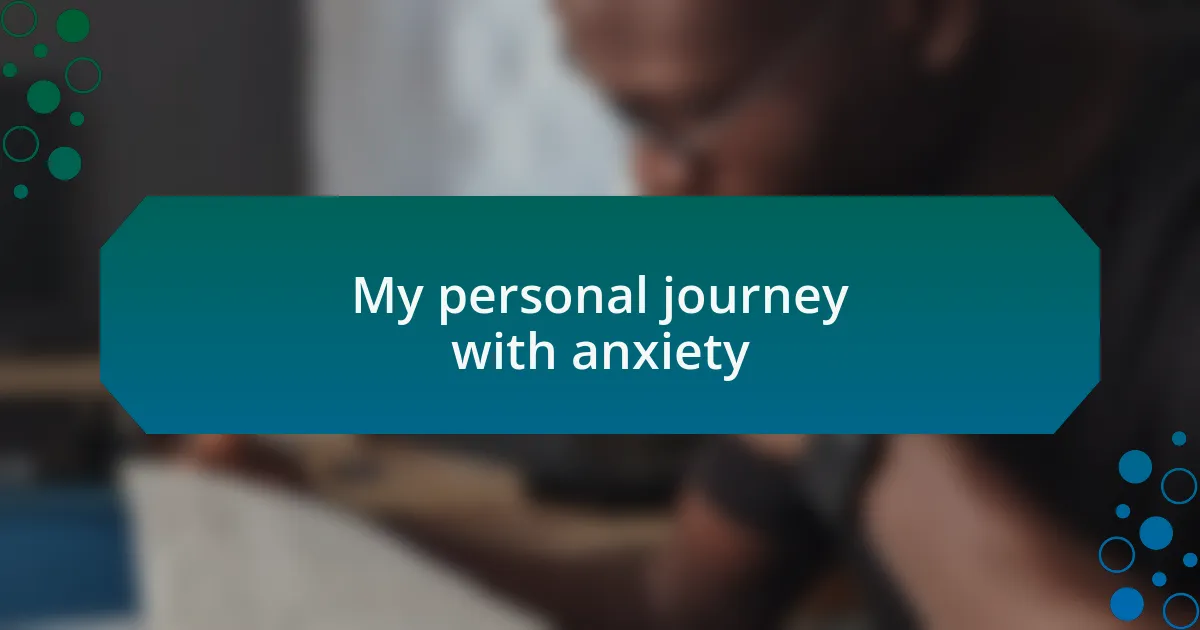
My personal journey with anxiety
I’ve had my fair share of battles with anxiety, and one of the most memorable was leading up to my first panel discussion. As the date approached, my mind was a whirlwind of worries—what if I stumbled over my words? What if the audience judged me? I vividly remember pacing around my living room that week, feeling a mix of excitement and dread. It’s strange how anxiety can morph excitement into a mountain of self-doubt, isn’t it?
There was a turning point for me during a particularly tense moment just minutes before stepping out on stage. I sat backstage, heart racing, when I stumbled upon a simple but profound thought: this moment was mine to own. I closed my eyes, visualized myself speaking confidently, and embraced the notion that vulnerability was part of my journey. In that instant, the weight of anxiety began to lift, and I felt a surge of empowerment that carried me through my presentation.
Reflecting on that experience, I realized how vital it is to acknowledge anxiety without letting it define me. I learned that everyone has their own struggles, and by sharing my journey, I could connect with others who felt the same. Sharing these vulnerable moments has become a source of strength for me, reminding me that my voice matters. How have your experiences shaped your understanding of anxiety?
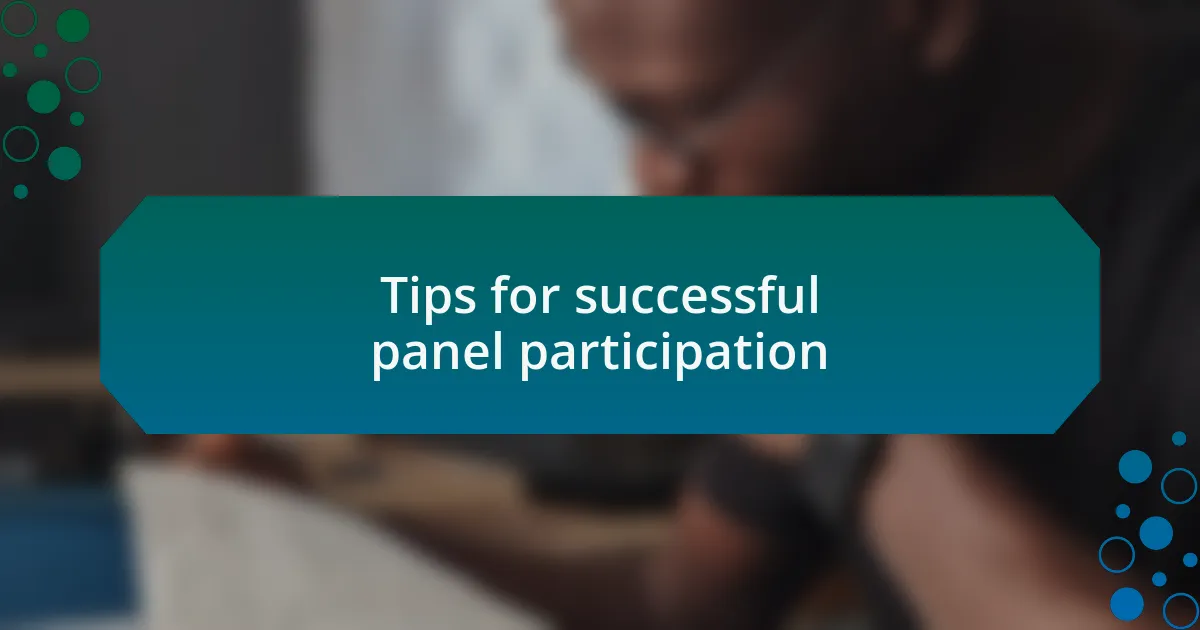
Tips for successful panel participation
Before stepping onto the panel, I found that preparation was key to calming my nerves. I would often spend hours researching not only the topic but also the interests of the other panelists. Familiarizing myself with their backgrounds helped me feel more connected and less intimidated. Have you ever felt that spark of confidence when you know your audience and peers? It makes a world of difference.
Another tactic I discovered was the power of practicing out loud. Initially, I’d rehearse in front of a mirror or even record myself to assess my tone and body language. This practice not only improved my delivery but also helped me identify the areas where I felt most anxious. Isn’t it fascinating how practice can transform anxiety into comfort? Each time I spoke aloud, I felt a little more at ease with my voice and ideas.
In the heat of the moment, I learned that engaging with the audience is one of the best remedies for panel anxiety. I remember glancing into the crowd and making eye contact with a few encouraging faces. It turned the experience from a nerve-wracking performance into a genuine conversation. Have you tried looking for familiar or friendly faces during your presentation? That connection can make all the difference, turning tension into a shared experience.